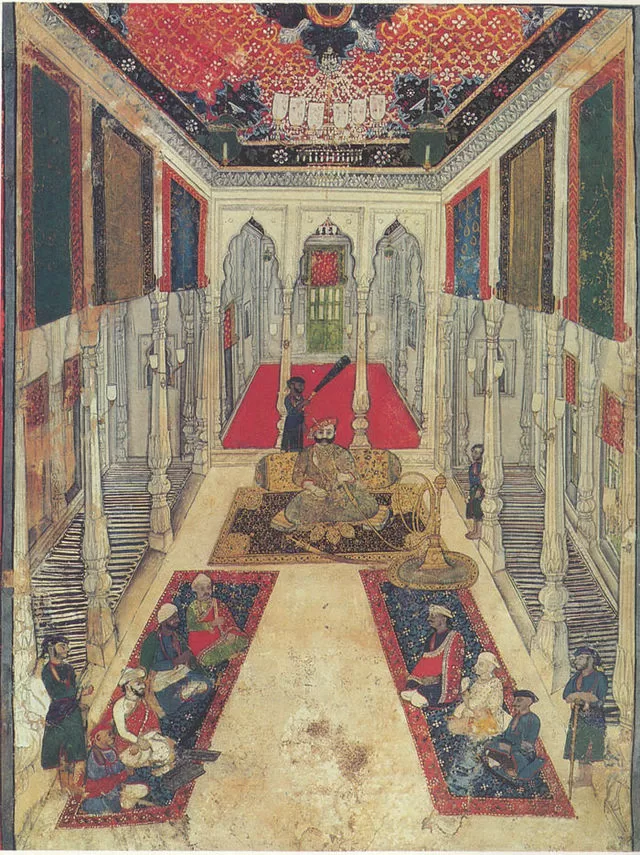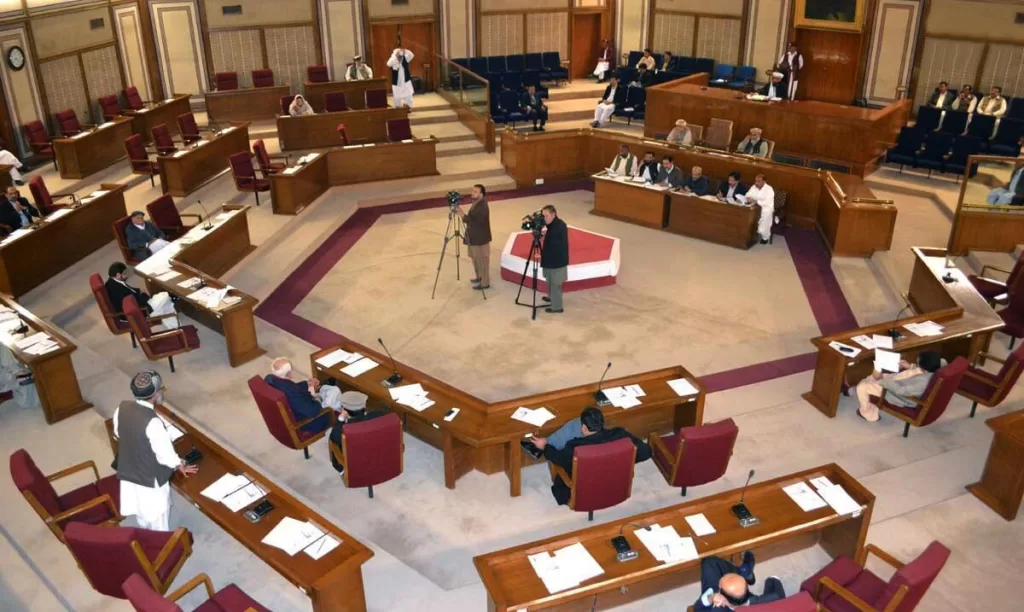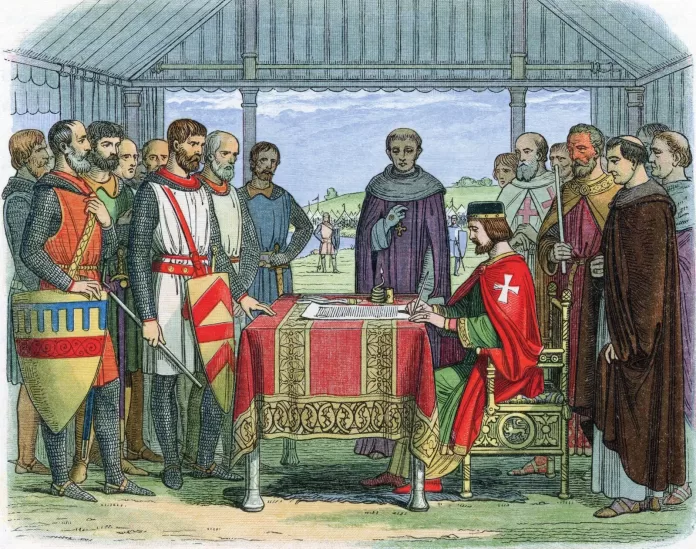The Magna Carta, or the “Charter of Liberties”, limiting the King’s power and strengthening the rights of nobles was agreed to by King John at Runnymede near London on June 15, 1215. Brokered by the Archbishop of Canterbury and meant to rein in rebellious barons, without any sincere intent John was simply playing for time to consolidate his despotic rule. Contrary to popular belief Magna Carta did not initiate the decline of feudalism but did establish the principle in the then western world that everyone including the king was subject to the law. The guaranteeing of the right to justice and a fair trial to any individual were already articulated and implemented in Islam as articles of faith 500 years earlier.
With the peasantry dependent upon landowners holding large tracts of lands doled out to them by the British between 1858 and 1947, feudalism is alive and well in Pakistan today. By bequeathing land which was not theirs in the first place, the British created a core of feudal lords, bureaucrats and military personnel, camouflaging the rule of their “Commonwealth” in the 20th century with different democratic models. Ingratiating themselves to the British overlords, the crown’s loyal native servants facilitated the crown rule over their fellow natives. Agrarian reforms did away with feudalism in India soon after 1947, East Pakistan (now Bangladesh) followed suit a few years later.
ZA Bhutto’s Houdini-like brand of “mixed-bag socialism” combined die-hard socialists like J A Rahim, Mairaj Mohammad Khan, Sheikh Mohammad Rashid, Meraj Khalid, etc, with hard core uncompromising feudals like Khar, Jatoi, Mumtaz Bhutto, etc. With the pendulum swinging to the right under General Zia ul Haq’s 1977 Martial law, feudalism further became entrenched in Pakistan. Blatantly camouflaging their inherent feudalism over the centuries as a democracy, the British successfully call theirs a constitutional monarchy. Can they explain the travesty of the un-elected House of Lords?
The basic principle “of the people, by the people and for the people” was mutilated by our democracy being intrinsically more flawed than a “constitutional” monarchy. Leo McKinstry was scathingly critical in The Telegraph in August 2015,”the continuing survival of the Lords is an indictment of the cowardice and inertia in British politics. Such an obese, obsolescent body should have no place in a modern democracy… every argument used to justify its existence is wrong. Its supporters like to pretend that it is packed with wise elder statesman, brilliant experts and distinguished public servants. This could not be further from the truth: most if its members are souped-up councilors, political apparatchiks, failed MPs and party donors.”

Freed of British bondage in 1947, feudal lords and bureaucrats continue to hold wise-like grip over Pakistan today, almost all political parties being run like feudal estates. The present form of elections is a mere ritual-like exercise with those elected to Parliament considering power to be a free license to loot, plunder and oppress the people, all in the name of the Constitution. Those elected depend upon “special interest groups” (and individuals) for survival rather than those who voted them into office. The ‘first-past- the post’ (FPTP) proliferating through the Commonwealth is the “democratic” formula devised by the British to perpetuate the feudal system.
This system favours the winner securing the highest number of votes, not necessarily the majority of votes in a constituency. This excludes smaller parties from ‘fair’ representation. This FPTP allows a small powerful minority to always come to power and rule over the majority with potential to spawn and sustain anarchy by creating divisions among sects, biradiris, castes, etc. Meant to foment strife FPTP is the democratic version of the British “divide and rule” policy. With this the case in more than 80% of the seats in our National and Provincial assemblies, it is vital to have a mandatory “run-off election” without an absolute majority in the first vote in a single constituency.
This way the voters will ultimately have two stark choices instead of the multiple ones in the first round. Besides exercising the will of the majority and make elections difficult to rig and manipulate, a run-off election will encourage diverse groupings to compromise to join together to get a majority. Marginalising the smaller parties causes frustration, voters deserve a voice in Parliament in proportion to the strength of the political groups in the electorate.
For “Proportional Representation” 20-25% of additional seats in Parliament should go to the losing candidates of the political parties on the basis of the percentage of the total votes cast for the losing candidates. The percentage of votes a party receives will then be more closely reflected in the number of seats it attains in the National Assembly (NA). In 2002, the PPP got lesser NA seats than the Pakistan Muslim League Quaid (PML-Q) despite having a greater number of votes. In 2013 Pakistan Tehreek-e-Insaf (PTI) was the second biggest party according to votes cast after the PML-N, it was ranked third in terms of NA seats.

Not held based on population alone, for elections a formula balancing population with land must be devised. Balochistan constitutes 43% of Pakistan’s total land mass with its wealth of natural resources, its vast rangeland, its coastal belt and rich mineral and hydrocarbon deposits.
Disenchantment among the local populace because of being treated negatively persist because of unrealistic policies by successive governments. The low-level insurgency has since been brought under control by the Pakistan Army. Out of the 342 seats in the National Assembly, Balochistan has just 14 seats.
Although Balochistan has equal representation in the upper house of parliament, it does not have a strong representation in the NA because its population is lower than any other province’s. Providing governance at the doorstep of the people is vital for any civilized society, without people participation at the grassroots level democracy becomes a farce. Functioning Local Bodies (LB) encourage self-participation, ownership, debate and involvement of local communities, stakeholders in the welfare and wellbeing of a unified society.
Our imperfect democracy is a readymade recipe for fomenting strife and undermining good governance at every level. Democracy will not be only possible in a hundred years unless the “Local Bodies” system coupled with “Proportional Representation” gives a voice to the people to overcome the feudal system making Pakistan’s present democracy a farce.





